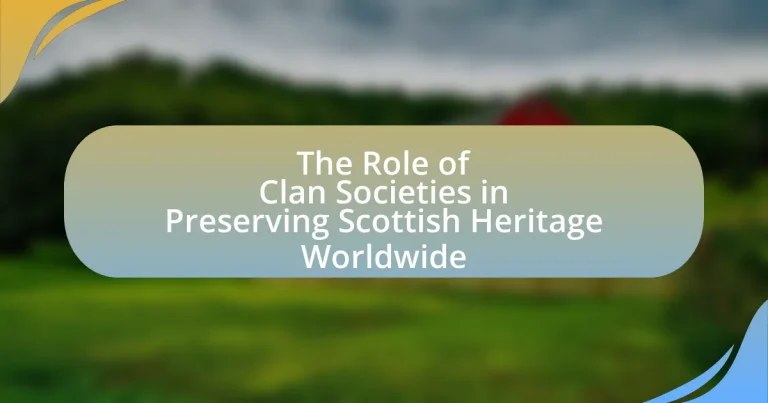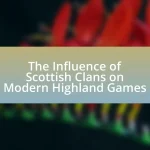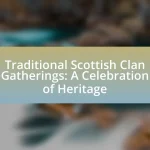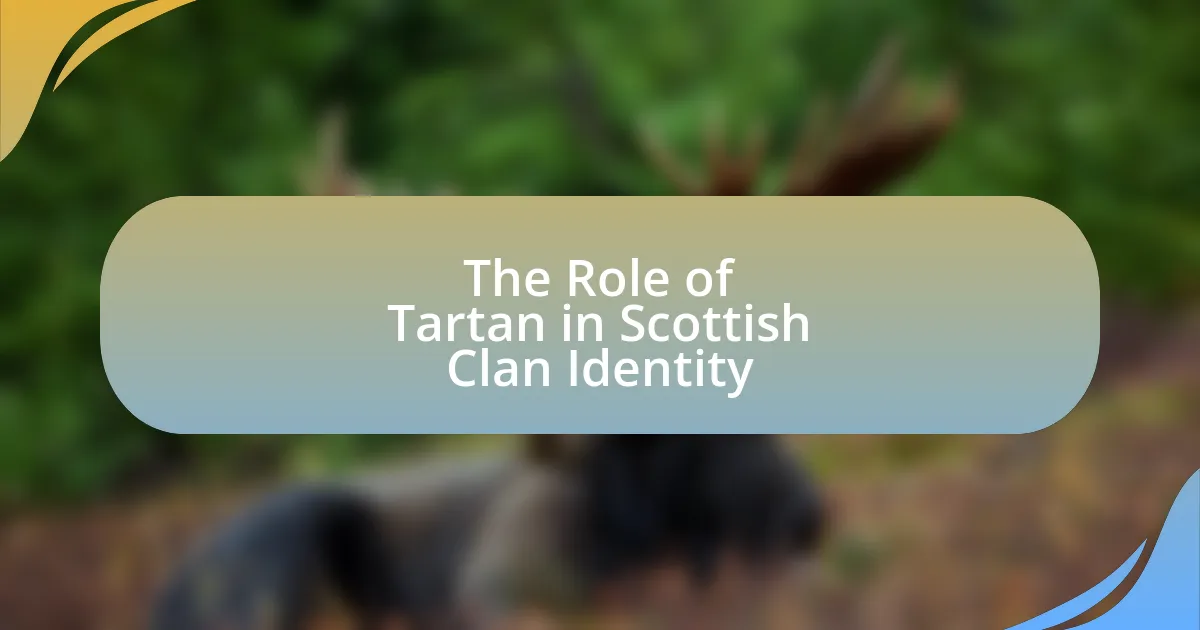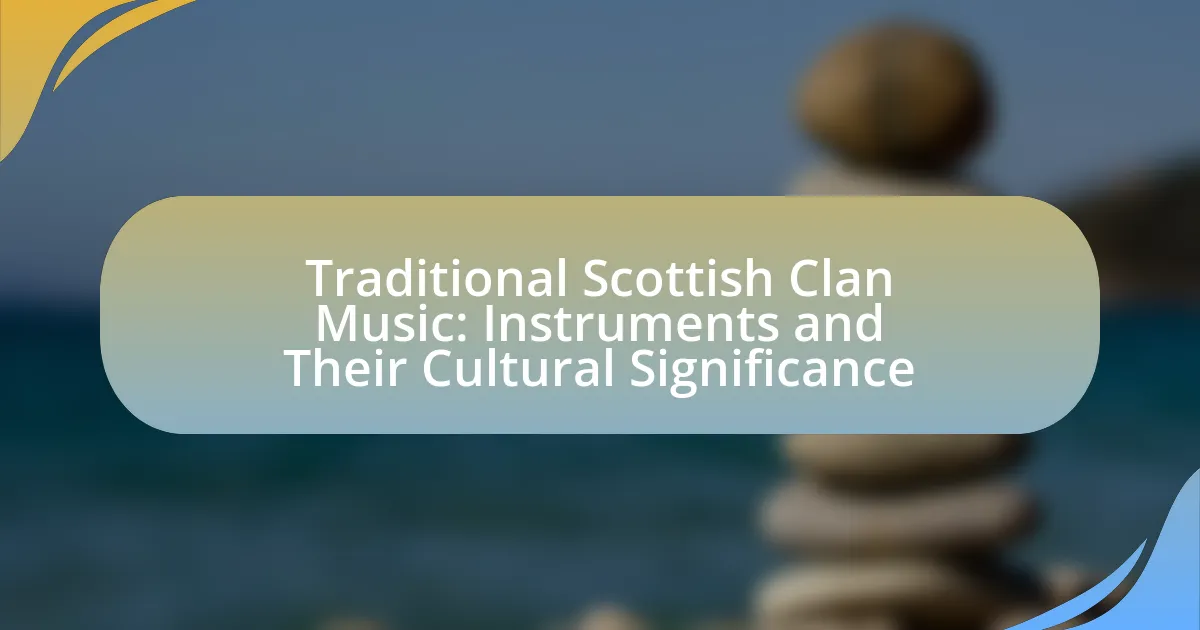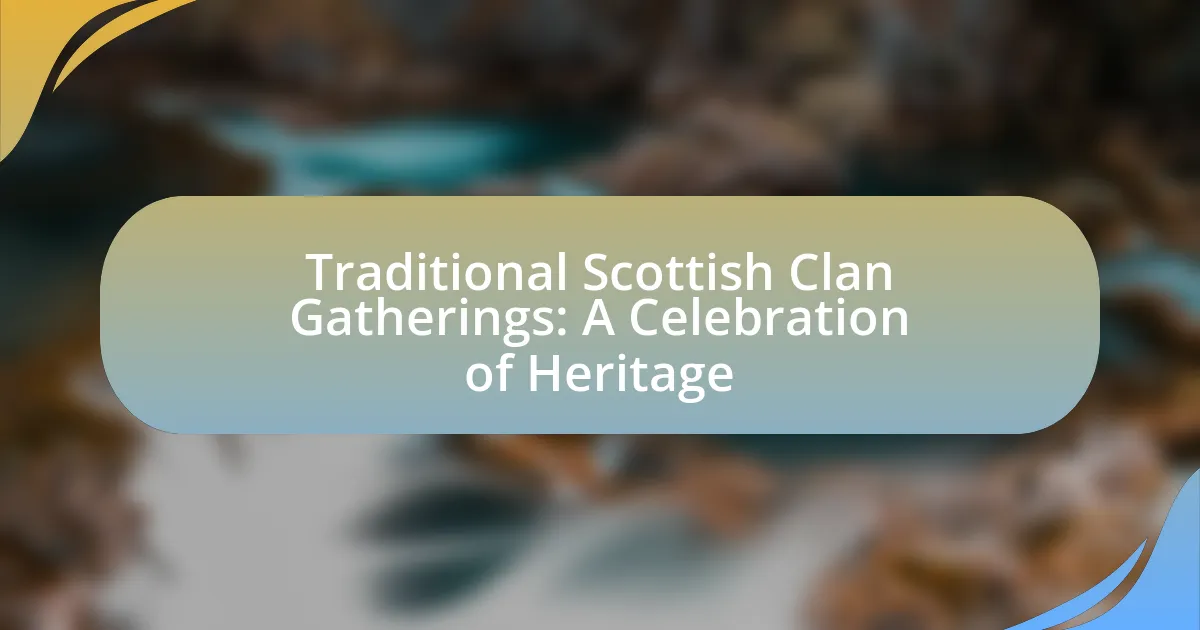Clan societies are pivotal in preserving Scottish heritage globally, fostering identity and community among individuals of Scottish descent. These organizations promote Scottish culture through events, educational programs, and genealogical research, helping members connect with their ancestry. They organize clan gatherings, maintain historical records, and engage in cultural exchanges, ensuring the continuity of traditions and enhancing the understanding of Scottish culture. Despite challenges such as globalization and funding constraints, clan societies employ strategies like community engagement and collaboration with educational institutions to sustain their heritage efforts and connect Scots worldwide.
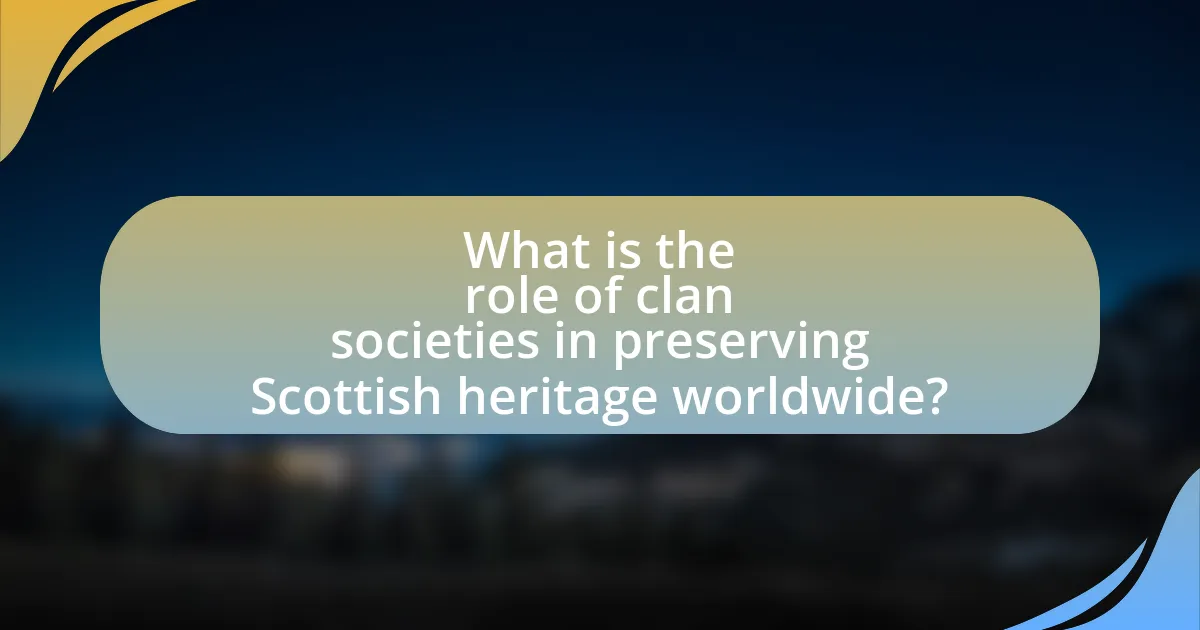
What is the role of clan societies in preserving Scottish heritage worldwide?
Clan societies play a crucial role in preserving Scottish heritage worldwide by fostering a sense of identity and community among individuals of Scottish descent. These organizations actively promote Scottish culture through events, educational programs, and the maintenance of historical records. For instance, the Clan Campbell Society and the Clan MacGregor Society organize gatherings and provide resources that celebrate Scottish traditions, music, and history. Additionally, clan societies often engage in genealogical research, helping members trace their ancestry and connect with their roots, which reinforces cultural continuity. The global reach of these societies, with members in countries such as the United States, Canada, and Australia, further amplifies their impact, ensuring that Scottish heritage remains vibrant and accessible to future generations.
How do clan societies contribute to the understanding of Scottish culture?
Clan societies significantly contribute to the understanding of Scottish culture by preserving and promoting the historical narratives, traditions, and identities associated with Scottish clans. These societies serve as custodians of clan heritage, organizing events such as clan gatherings and cultural festivals that celebrate Scottish history and customs. For instance, the Clan Campbell Society and the Clan MacDonald Society actively engage in educational initiatives that highlight the historical significance of their clans, fostering a deeper appreciation for Scotland’s diverse cultural landscape. Additionally, clan societies often maintain archives and genealogical records, which provide insights into the lineage and social structures of Scottish families, further enriching the understanding of Scottish cultural identity.
What specific traditions do clan societies promote?
Clan societies promote specific traditions such as clan gatherings, tartan wearing, and the celebration of historical events significant to the clan’s heritage. These gatherings, often held at Highland games or clan festivals, serve to strengthen community bonds and preserve cultural identity. Tartan, a distinctive pattern associated with specific clans, symbolizes lineage and pride, while commemorating historical events fosters a sense of continuity and connection to ancestral roots. These practices are integral to maintaining Scottish heritage and are evidenced by the ongoing popularity of events like the Gathering of the Clans, which attracts thousands of participants and spectators, reinforcing the cultural significance of these traditions.
How do clan societies educate members about their heritage?
Clan societies educate members about their heritage through organized events, storytelling, and educational programs. These societies often host gatherings such as clan gatherings, festivals, and cultural events where members can learn about their history, traditions, and values. Additionally, storytelling plays a crucial role, as elders share tales of ancestors and significant historical events that shaped the clan’s identity. Educational programs may include workshops on traditional crafts, music, and dance, which further reinforce cultural knowledge and skills. This multifaceted approach ensures that members not only receive information but also engage actively with their heritage, fostering a strong sense of identity and community.
Why are clan societies important for Scottish identity?
Clan societies are important for Scottish identity because they serve as a vital link to Scotland’s historical, cultural, and social heritage. These societies foster a sense of belonging and community among individuals who share a common clan lineage, reinforcing connections to ancestral roots and traditions. Historically, clans played a significant role in Scottish society, providing social structure and support, which continues to resonate today. The preservation of clan tartans, crests, and customs helps maintain a distinct Scottish identity, while clan gatherings and events promote cultural pride and unity among Scots worldwide.
In what ways do clan societies foster a sense of belonging?
Clan societies foster a sense of belonging through shared identity, cultural traditions, and communal support. Members of clan societies often share a common ancestry, which creates a strong familial bond and a sense of unity. This shared heritage is celebrated through cultural events, such as clan gatherings and festivals, where members participate in traditional music, dance, and storytelling, reinforcing their connection to their roots. Additionally, clan societies provide a support network, offering assistance in times of need, which further strengthens interpersonal relationships and fosters loyalty among members. Historical evidence shows that clan societies have played a crucial role in maintaining Scottish culture and identity, particularly during periods of diaspora, by creating communities that uphold and transmit their heritage across generations.
How do clan societies influence the perception of Scottish heritage globally?
Clan societies significantly influence the perception of Scottish heritage globally by promoting cultural identity and fostering community connections among Scots and their descendants worldwide. These societies organize events such as Highland games, clan gatherings, and cultural festivals, which showcase traditional Scottish music, dance, and customs, thereby enhancing global awareness and appreciation of Scottish culture. For instance, the Clan Campbell Society and the Clan MacGregor Society actively engage in preserving historical records and promoting Scottish traditions, which helps maintain a strong sense of identity among members and their families. This cultural promotion is supported by the fact that there are over 500 clan societies worldwide, which collectively contribute to a robust network that celebrates and disseminates Scottish heritage, making it more accessible and recognizable on a global scale.
What challenges do clan societies face in preserving heritage?
Clan societies face significant challenges in preserving heritage, primarily due to globalization, which often dilutes traditional practices and values. As modern influences permeate communities, younger generations may prioritize contemporary lifestyles over ancestral customs, leading to a decline in cultural transmission. Additionally, financial constraints hinder the ability of clan societies to organize events, maintain historical sites, and support educational initiatives that promote heritage awareness. A study by the Scottish Government in 2019 highlighted that 70% of heritage organizations reported funding as a critical barrier to their operations. Furthermore, the lack of documentation and resources for oral histories poses a risk to the preservation of unique clan narratives, as many stories are passed down verbally and may be lost without proper recording.
How do modern influences impact traditional practices?
Modern influences significantly alter traditional practices by introducing new technologies, cultural exchanges, and globalization, which can lead to the adaptation or dilution of these practices. For instance, the rise of social media allows clan societies to connect with a global audience, promoting Scottish heritage but also leading to the commercialization of traditional customs. A study by the University of Edinburgh highlights that while clan gatherings have increased in number due to modern communication, the authenticity of traditional rituals may be compromised as they adapt to contemporary expectations.
What strategies do clan societies use to overcome these challenges?
Clan societies employ various strategies to overcome challenges in preserving Scottish heritage, including community engagement, cultural education, and collaboration with other organizations. Community engagement fosters a sense of belonging and encourages participation in heritage activities, which strengthens the clan’s identity. Cultural education initiatives, such as workshops and events, promote awareness and appreciation of Scottish traditions among both clan members and the wider public. Collaboration with other organizations, including cultural institutions and governmental bodies, enhances resource sharing and amplifies the impact of preservation efforts. These strategies are essential for maintaining the relevance and vitality of Scottish heritage in a global context.
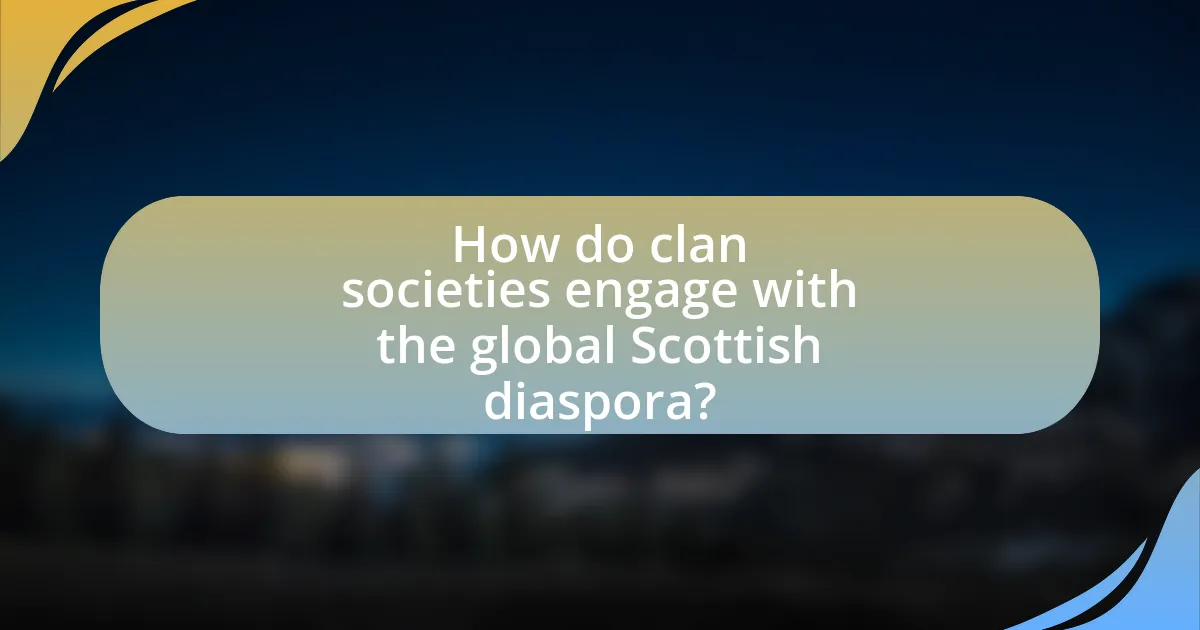
How do clan societies engage with the global Scottish diaspora?
Clan societies engage with the global Scottish diaspora by fostering connections through events, cultural exchanges, and digital platforms. These societies organize gatherings such as clan gatherings, Highland games, and festivals that invite diaspora members to participate, thereby strengthening their ties to Scottish heritage. For instance, the Clan Campbell Society hosts international events that attract members from various countries, promoting cultural continuity. Additionally, many clan societies utilize social media and websites to share resources, news, and heritage-related content, facilitating ongoing engagement with those who identify with their clan. This approach not only preserves traditions but also encourages diaspora members to explore their ancestry, contributing to a sense of belonging and identity within the global Scottish community.
What role do clan societies play in connecting Scots abroad?
Clan societies play a crucial role in connecting Scots abroad by fostering a sense of community and shared identity among individuals of Scottish descent. These organizations facilitate cultural exchange, provide networking opportunities, and promote Scottish traditions through events such as Highland games, festivals, and gatherings. For instance, the Clan Campbell Society and the Clan MacGregor Society actively engage members worldwide, organizing reunions and cultural events that reinforce ties to Scotland. Additionally, clan societies often serve as resources for genealogical research, helping members trace their ancestry and connect with their heritage, thereby strengthening the global Scottish community.
How do clan societies facilitate cultural exchanges among members worldwide?
Clan societies facilitate cultural exchanges among members worldwide by organizing events, sharing resources, and promoting communication among their members. These societies often host gatherings such as clan festivals, which attract participants from various countries, allowing individuals to share traditions, stories, and practices that reflect their heritage. For instance, the Clan Campbell Society hosts international gatherings that encourage members to engage in cultural activities, fostering a sense of community and shared identity. Additionally, clan societies utilize digital platforms to connect members globally, enabling the exchange of cultural materials, such as music, art, and literature, which further enriches the collective understanding of Scottish heritage. This structured approach to cultural exchange not only preserves traditions but also adapts them to contemporary contexts, ensuring their relevance across generations.
What events do clan societies organize to strengthen ties within the diaspora?
Clan societies organize various events such as annual gatherings, cultural festivals, and educational workshops to strengthen ties within the diaspora. These events facilitate networking among members, promote cultural heritage, and foster a sense of community. For instance, the Clan Gathering, often held in Scotland, attracts members from around the world, allowing them to connect and celebrate their shared ancestry. Additionally, cultural festivals showcase traditional music, dance, and cuisine, reinforcing cultural identity and unity among diaspora members. Educational workshops on genealogy and Scottish history further enhance members’ understanding of their heritage, solidifying their connection to the clan and each other.
How do clan societies support Scottish communities outside Scotland?
Clan societies support Scottish communities outside Scotland by fostering cultural connections, providing financial assistance, and promoting heritage education. These organizations often organize events such as Highland games, festivals, and gatherings that celebrate Scottish traditions, allowing expatriates to maintain their cultural identity. Additionally, clan societies frequently engage in charitable activities, offering scholarships and funding for community projects that benefit Scottish descendants abroad. For example, the Clan Campbell Society has been known to support educational initiatives and cultural preservation efforts, reinforcing the ties between Scottish heritage and contemporary communities.
What initiatives do clan societies undertake to promote Scottish culture internationally?
Clan societies undertake various initiatives to promote Scottish culture internationally, including organizing cultural events, participating in festivals, and supporting educational programs. These societies host Highland games, which showcase traditional Scottish sports, music, and dance, attracting participants and audiences from around the world. Additionally, they engage in outreach through social media and online platforms to share Scottish history, language, and customs. For instance, the Clan Campbell Society has been known to sponsor scholarships for students studying Scottish heritage, thereby fostering a deeper understanding of Scottish culture globally.
How do clan societies collaborate with other organizations to enhance their impact?
Clan societies collaborate with other organizations by forming partnerships that leverage shared resources, expertise, and networks to amplify their cultural and heritage initiatives. For instance, clan societies often work with cultural institutions, educational organizations, and tourism boards to promote Scottish heritage through events, exhibitions, and educational programs. This collaboration enhances visibility and engagement, as seen in joint events like the Gathering of the Clans, which attracts thousands and showcases Scottish culture globally. Additionally, partnerships with universities for research projects on Scottish history further solidify their impact, as evidenced by studies that highlight the importance of clan heritage in contemporary Scottish identity.
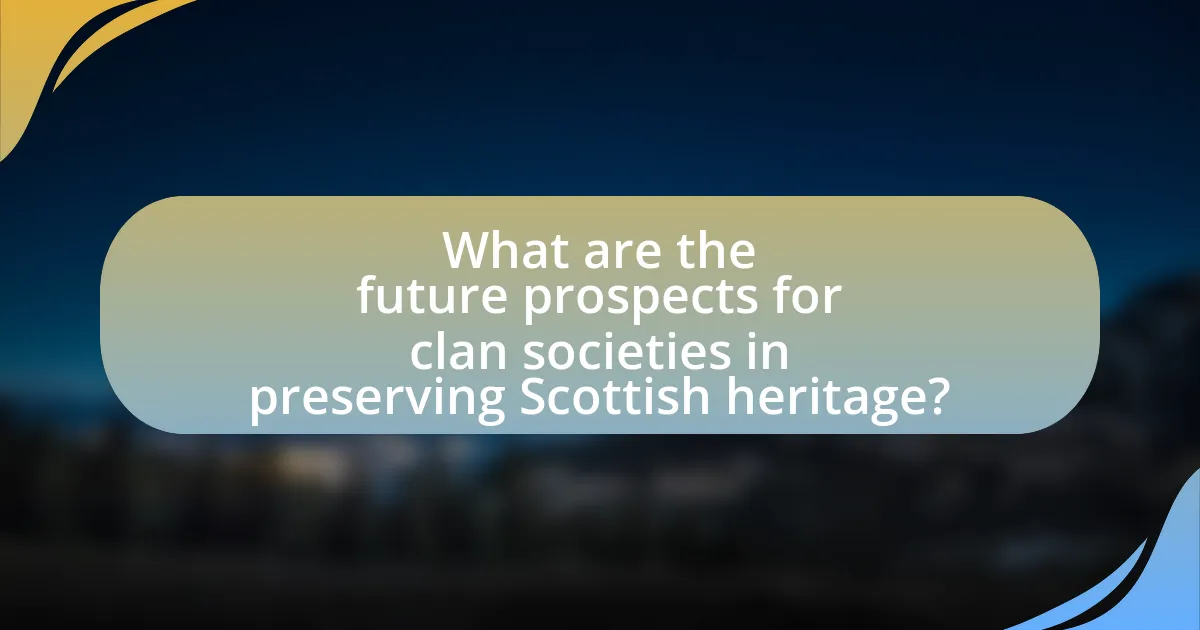
What are the future prospects for clan societies in preserving Scottish heritage?
Clan societies are likely to play a crucial role in preserving Scottish heritage in the future. These organizations actively promote cultural events, maintain historical records, and foster community engagement, which are essential for the continuity of traditions. For instance, the Clan Campbell Society and the Clan MacGregor Society organize gatherings and educational programs that celebrate Scottish history and customs. Additionally, the increasing global interest in genealogy and heritage tourism provides clan societies with opportunities to expand their outreach and influence. This engagement not only helps to sustain traditional practices but also encourages younger generations to connect with their ancestry, ensuring that Scottish heritage remains vibrant and relevant.
How can technology aid clan societies in their mission?
Technology can aid clan societies in their mission by enhancing communication, preserving cultural heritage, and facilitating global outreach. Digital platforms enable clan societies to connect members worldwide, share resources, and organize events efficiently. For instance, social media allows for real-time updates and engagement, fostering a sense of community among dispersed members. Additionally, technology such as digital archiving tools helps preserve historical documents, photographs, and artifacts, ensuring that cultural heritage is maintained for future generations. A study by the Scottish Government in 2020 highlighted that digital initiatives significantly increased participation in cultural activities, demonstrating the effectiveness of technology in promoting and preserving Scottish heritage.
What digital tools are being utilized by clan societies for outreach?
Clan societies utilize various digital tools for outreach, including social media platforms, websites, and email newsletters. Social media platforms like Facebook and Instagram enable clan societies to engage with members and promote events, while dedicated websites serve as informational hubs for resources, history, and membership details. Email newsletters facilitate direct communication with members, providing updates and fostering community involvement. These tools enhance visibility and connectivity, allowing clan societies to effectively reach a global audience and promote Scottish heritage.
How can social media enhance the visibility of clan societies?
Social media enhances the visibility of clan societies by providing platforms for sharing cultural content, connecting members globally, and promoting events. These platforms allow clan societies to showcase their heritage through photos, videos, and stories, reaching a wider audience beyond geographical limitations. For instance, Facebook groups and Instagram pages dedicated to specific clans can attract followers interested in Scottish culture, leading to increased engagement and participation in clan activities. Additionally, social media analytics can help clan societies understand their audience better, tailoring content to enhance interaction and visibility.
What best practices can clan societies adopt for effective heritage preservation?
Clan societies can adopt several best practices for effective heritage preservation, including documentation of oral histories, organization of cultural events, and collaboration with local communities. Documenting oral histories ensures that personal narratives and traditions are recorded for future generations, as evidenced by initiatives like the Scottish Oral History Centre, which emphasizes the importance of preserving local voices. Organizing cultural events, such as clan gatherings and festivals, fosters community engagement and raises awareness about heritage, similar to the annual Clan Gathering in Scotland that attracts thousands and promotes cultural pride. Collaboration with local communities enhances preservation efforts by pooling resources and knowledge, as demonstrated by partnerships between clan societies and heritage organizations, which have successfully restored historical sites and artifacts. These practices collectively contribute to the sustainability and visibility of Scottish heritage worldwide.
How can clan societies engage younger generations in heritage activities?
Clan societies can engage younger generations in heritage activities by implementing interactive programs that emphasize cultural education and community involvement. These programs can include workshops on traditional crafts, storytelling sessions that highlight clan history, and participation in local festivals that celebrate Scottish culture. For instance, the Clan Campbell Society has successfully organized events that attract youth by incorporating music, dance, and hands-on activities, fostering a sense of belonging and pride in their heritage. Such initiatives not only educate younger members about their ancestry but also create opportunities for social interaction, ensuring the continuity of cultural practices.
What role does collaboration with educational institutions play in preservation efforts?
Collaboration with educational institutions plays a crucial role in preservation efforts by providing research, resources, and expertise necessary for effective heritage conservation. Educational institutions often engage in interdisciplinary studies that enhance understanding of cultural heritage, leading to informed strategies for preservation. For instance, partnerships between clan societies and universities can facilitate the documentation of oral histories and traditional practices, ensuring that these elements of Scottish heritage are recorded and transmitted to future generations. Additionally, educational programs can raise awareness and foster community involvement in preservation initiatives, as seen in projects where students participate in fieldwork related to local heritage sites. This collaborative approach not only enriches academic knowledge but also empowers communities to take an active role in safeguarding their cultural identity.
What practical steps can individuals take to support clan societies?
Individuals can support clan societies by actively participating in clan events and gatherings, which fosters community engagement and strengthens cultural ties. By attending clan festivals, individuals contribute to the preservation of Scottish heritage through shared traditions and practices. Additionally, volunteering for clan society initiatives, such as organizing events or educational programs, enhances the visibility and impact of these organizations. Supporting clan societies financially, through donations or membership fees, provides essential resources for their activities and outreach efforts. Engaging in social media campaigns to promote clan activities can also raise awareness and attract new members, further ensuring the longevity of these cultural institutions.
